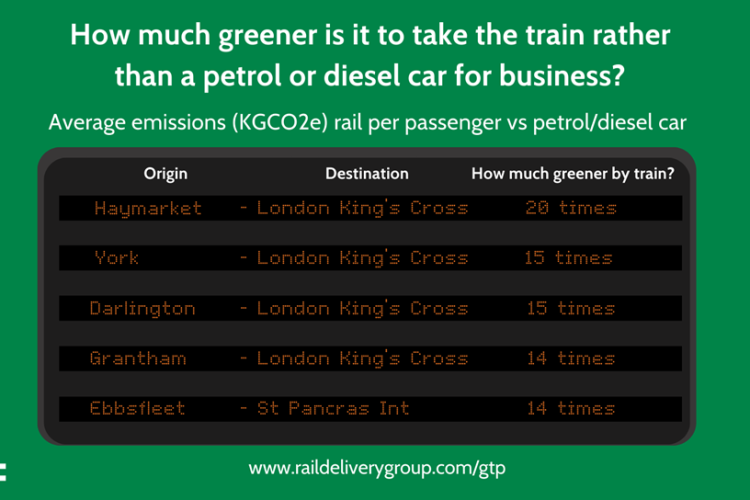Rail travel is almost nine times greener than by car on the Top 100 business routes new figures show
Posted: 28 February 2024 | Emily Budgen | No comments yet
Those who choose the train for common business routes are choosing an option nine times greener than car travel, recent study finds.


The next phase of Green Travel Pledge carbon emission passenger data shows journeys along 100 of Britain’s busiest business routes create significantly less carbon emissions by rail compared to travelling by car.
On average across the top 100 business travel routes, taking the train for business travel produces nine times less carbon than going by diesel or petrol car, more than four times less carbon than using a plug-in hybrid electric car and almost two-and-a-half times less carbon than using a battery electric car.
Some of the business travel journeys with the lowest carbon emissions per passenger (compared to one person travelling alone by petrol or diesel car) include: London King’s Cross to York (produces 15.13 times less carbon), Darlington to London King’s Cross (produces 14.88 times less carbon) and Ebbsfleet International to St Pancras International (produces 14.41 times less carbon).
But the figure is as a high as almost 20 times greener for the route from Haymarket Station in Edinburgh to London King’s Cross which produces 19.85 times fewer CO₂ emissions.
This is the first time that detailed rail data from across the industry – including engine type, fuel type, journey distance, occupancy and carriage layout – has been combined to showcase the environmental benefits of rail travel for the top 100 business routes across Britain.
Top 10 busiest business travel routes with the lowest carbon emissions
|
Origin |
Destination |
Average petrol/diesel car emissions (KGCO2e) |
Rail average emissions per passenger (KGCO2e) |
Number of times difference between rail and petrol/diesel car emissions |
|
Haymarket |
London King’s Cross |
119.08 |
6 |
19.85 |
|
London King’s Cross |
York |
58.99 |
3.9 |
15.13 |
|
Darlington |
London King’s Cross |
70.68 |
4.75 |
14.88 |
|
London King’s Cross |
Grantham |
32.14 |
2.23 |
14.41 |
|
Ebbsfleet International |
St Pancras International |
7.31 |
0.52 |
14.05 |
|
London King’s Cross |
Newcastle |
80.73 |
5.98 |
13.50 |
|
Westfield Westgate |
London King’s Cross |
53.51 |
3.98 |
13.45 |
|
London King’s Cross |
Leeds |
56.25 |
4.23 |
13.30 |
|
Doncaster |
London King’s Cross |
47.67 |
3.59 |
13.28 |
|
Ipswich |
London Liverpool Street |
23.93 |
1.86 |
12.86 |
Jacqueline Starr, CEO at Rail Delivery Group, said: “We all have a responsibility to reduce our carbon footprint, and the data that we have published reveals that rail is the green choice for travel between our towns and cities.
“We know that businesses need accurate and reliable carbon emission data they can trust. From today, businesses will be able to see the most accurate measure of rail business travel emissions available for the 100 most popular business journeys. This will allow travellers to make greener travel choices by providing reliable carbon data when they book their next train ticket.
“This is an important milestone but we want to do more. We want to help business travellers to make greener travel choices. Having our Green Travel Pledge data available through global and domestic travel management companies and online booking tools will enable more businesses to choose rail as their first choice for business travel and reduce their carbon footprint.”
Clive Wratten, CEO at the Business Travel Association, said: “We’ve heard loud and clear from our members and the business travel community that consistency in carbon measurement is an imperative.
“This initiative from RDG on behalf of the whole rail industry has the potential to provide clarity and a robust green message to all parts of business travel.”
Sarah Ockendon, Procurement Manager at the John Lewis Partnership, said: “This will empower us to make better informed decisions about rail as a sustainable business travel option.
“The Green Travel Pledge will offer a reliable evidence base to demonstrate rail’s role in helping us to reach our CO2 sustainability goals.”
Dan Beauchamp, Head of Global & Multinational Consulting at Amex Global Business Travel, said: “At Amex GBT, we believe travel powers progress and rail has a fundamental role in driving more sustainable travel.
“We’ve worked with RDG’s Green Travel Pledge initiative since its inception. Access to granular emissions data for rail is a key requirement for our customers as growing numbers of them promote modal shift as an enabler for their sustainability commitments.”
You can view our league table of the 100 greenest business routes to see your local route and compare how green it is to driving by yourself.
This data has been developed by Rail Delivery Group – in partnership with Thrust Carbon, 3Squared, Black Box Partnerships and the wider rail industry – as part of the rail industry’s Green Travel Pledge – a commitment to provide businesses with detailed, accurate and reliable data on the carbon emissions of rail journeys across Britain to help highlight rail’s environmental benefits.
The data aims to create an industry benchmark for transport carbon emissions and is believed to be the most accurate carbon emission data ever created for rail business travel in Britain.
More Like This
Earn 40,000 bonus points for a limited time as a new Amtrak guest rewards preferred cardholder
Union Pacific invest $3.4 billion for safe operations and customer growth
Passengers power equivalent of 7,500 homes annually by choosing Lumo
Related topics
Related organisations
3Squared, Amex Global Business Travel, Black Box Partnerships, Business Travel Association, John Lewis Partnership, Rail Delivery Group (RDG), Thrust Carbon
Related people
Clive Wratten, Dan Beauchamp, Jacqueline Starr, Sarah Ockendon







